I
IncendiaryLemon
Guest
Originating in 1954 as a stark reminder of the dangers of nuclear weaponry, the Godzilla franchise stands as one of the longest in film history, amassing more than 30 entries over the 6 decades since its inception. Over the years, the series has seen a lot of change, going from the serious and poignant drama of the original to a string of kaiju action movies, as the titular monster faced off against an ever increasing list of foes, including Mothra, Rodan, MechaGodzilla, King Ghidorah and even the legendary King Kong. Despite immense popularity, Godzilla has remained dormant for the better part of 15 years, with the last entry (not including the mediocre American botch-job) being 2004’s Godzilla Final Wars, a movie which saw the series at the height of its silliness, featuring insane kung-fu fighting alien invaders and Godzilla battling pretty much every kaiju featured in the films to date. Enter: Shin Godzilla, a reboot from the legendary anime director Hideaki Anno (Neon Genesis Evangelion, Gunbuster, Nadia: Secret of the Water) and long-time collaborator Shinji Higuchi (live action Attack on Titan movies) that aims to take Godzilla back to basics.
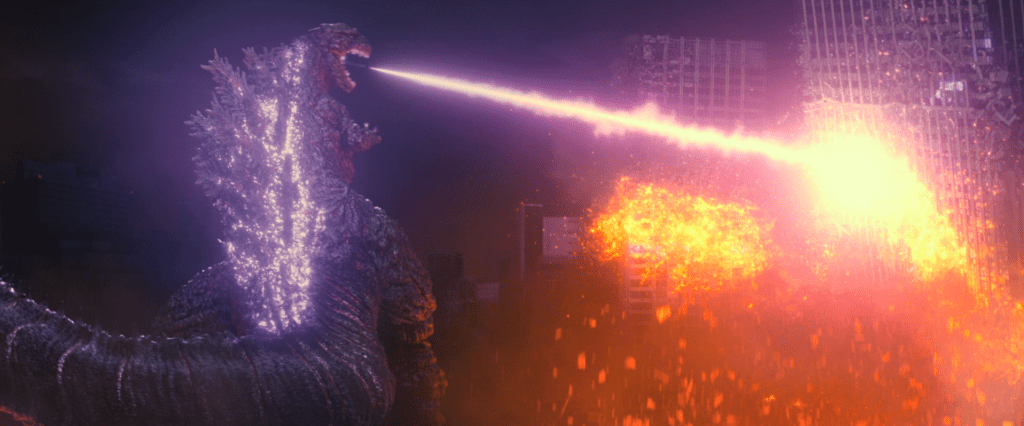
When I say ‘back to basics’, I really mean it, as Shin Godzilla has far more in common with the original 1950s incarnation of the series than any of the recent films. There’s no silly or over-the-top story, nor is there any other kaiju for Godzilla to fight, this is just Godzilla in its most pure form, depicting the political powers in Japan attempting to figure out a method to halt the creature before it can cause further destruction, and it does so in a very realistic manner. Whilst the black-and-white original was inspired by the fear of nuclear Armageddon that was rampant at the time, Shin Godzilla attempts to bring the same kind of horror to modern day audiences by taking direct inspiration from real life Japanese disasters that have occurred in recent years, namely the Fukushima nuclear disaster and the 2011 Tohoku earthquake and tsunami, and portraying the fallout in as realistic a way as possible. To achieve this, the film is directed almost like a documentary outside of the action scenes, with little in the way of camera movement, relying upon static angles, and splicing in fake news segments and smartphone footage, which really aids its attempts at realism. Whilst this style is far removed from what came before, it makes this rebooted universe stand out and feel distinct from its predecessors in a good way, with the result being incredibly effective.
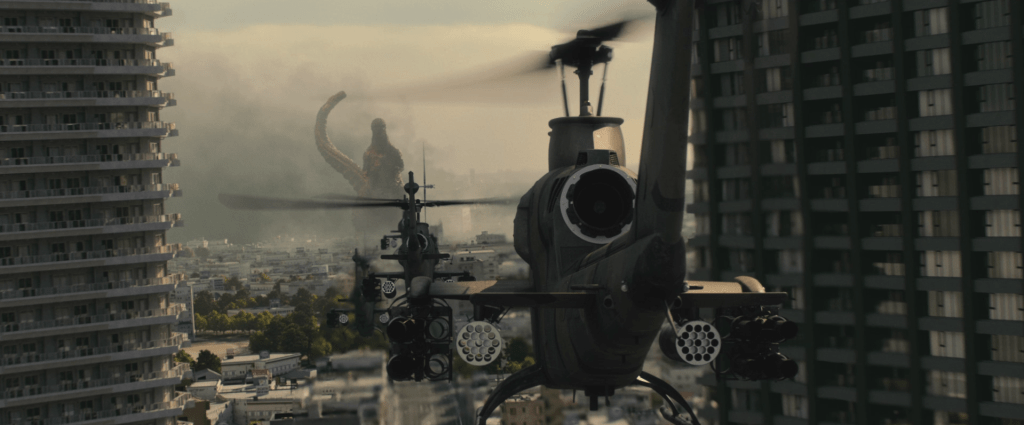
Paired with the similarities to recent disasters is a very political edge too. The portrayal of the Japanese government here isn’t always an entirely positive one, as we see the Prime Minister act indecisively leading to poor consequences and bow to pressure from the US and other countries, who attempt to usurp control of the situation. Assuming that the parallels to the disasters and the portrayal of the government as sometimes incompetent isn’t accidental, Shin Godzilla acts as a stark statement on the Japanese political climate as well as a being a monster movie.
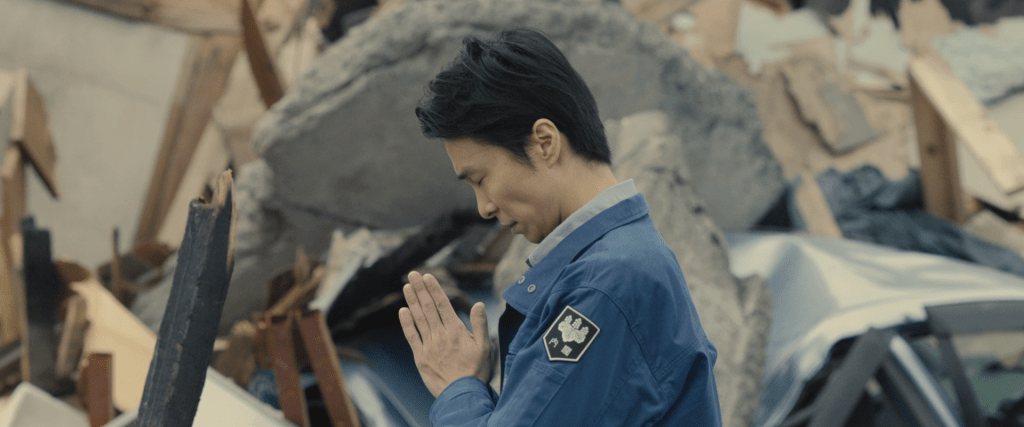
All that being said, however, this drastic alteration in both style and tone might put off some fans of the older movies, which as I mentioned before, were goofy kaiju fight-fests, and have very little in common with Shin Godzilla. I would wholeheartedly recommend that old diehards try and go into this with an open mind at least, and prepare for something entirely fresh and new.
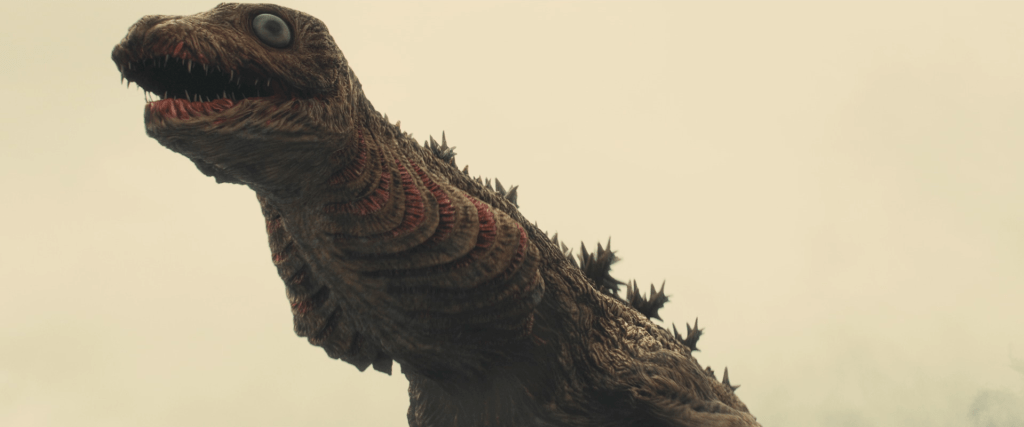
As you’d expect with a reboot for a modern era, Shin Godzilla’s special effects have seen a huge overhaul, which I expect might split fans. The old films used practical effects, having Godzilla be an actor in a rubber suit and having the destruction done using miniature sets and models. Shin Godzilla instead opts to rely on CGI to both create the creature and to realise the ensuing chaos, and the outcome is somewhat mixed. As anyone who’s seen an effects-heavy Japanese movie in recent years can likely attest, CGI in Japan is a fair bit behind Hollywood in terms of effects quality, and although I’d say the CGI in Shin Godzilla is above average, it still doesn’t quite match up to what we’re used to seeing in English-speaking movies, and this is painfully obvious in close-up shots of the monster, which doesn’t look great at all. Despite this, when the camera pulls back, it looks pretty good, and even better the farther away the camera is. This results in one of my favourite shots in the film, just after Godzilla’s first use of his infamous atomic breath, as we see Godzilla standing among the wreckage, and it looks stunning.
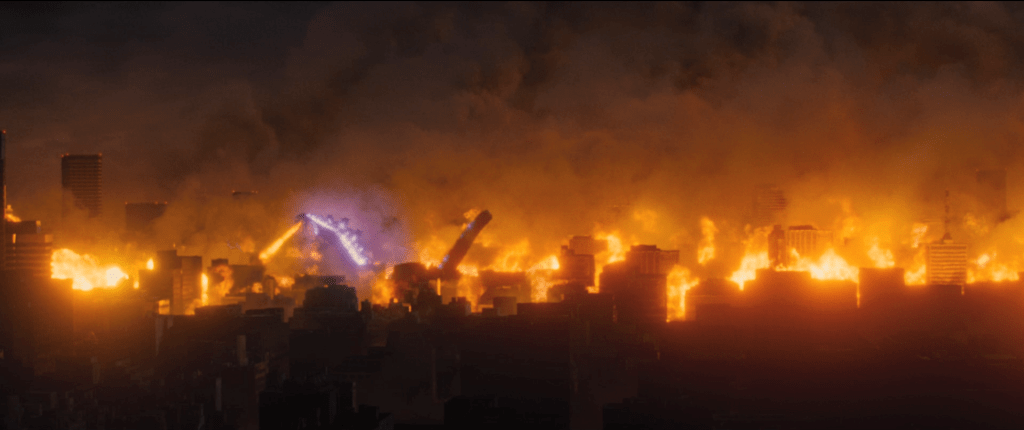
It’s also that same scene that hammers home how downright excellent the score for Shin Godzilla is. Composed by Shiro Sagisu, another Evangelion alumni and frequent collaborator of Anno’s, the soundtrack makes use of iconic songs from the franchise’s catalogue, as well as a whole host of original and brilliant tracks to boot, including, strangely enough, a new arrangement of ‘Decisive Battle’ from the Neon Genesis Evangelion soundtrack, which is instantly recognizable to any Eva fan.
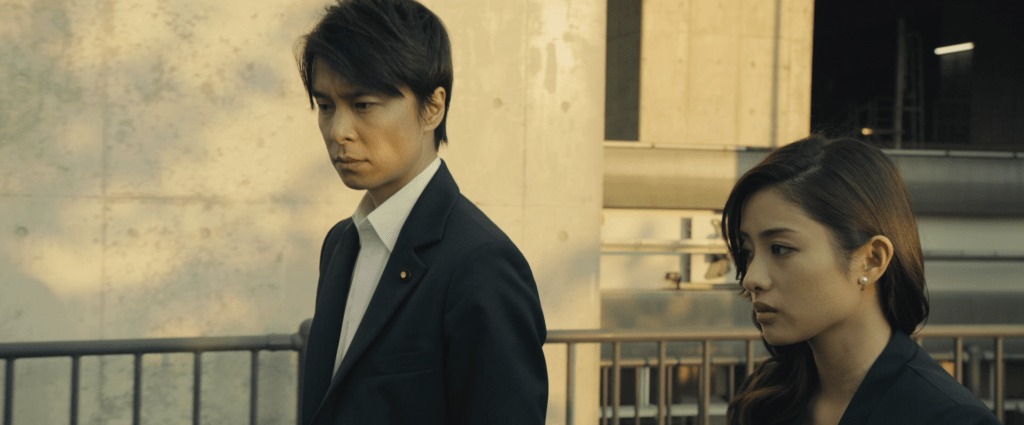
The old monster movies of decades past are often associated with very cheesy, hammy and over-the-top acting, and Godzilla is no exception. However, like a lot of things this movie does, Shin Godzilla aims to dispel this notion, featuring some pretty great performances from all involved, especially Hiroki Hasegawa, who plays the lead Yaguchi. If there’s one thing I will recommend, it’s sticking to the Japanese voice track, as the dub is as bad as those old movies. Not necessarily performance-wise, as the dub is produced by Funimation and the voice actors do as well as can be expected, but dubbing in live action never works. The lips don’t sync in the slightest, and it is horribly distracting, not to mention you can blatantly tell that it was recorded in a studio as it doesn’t sound right at all. There isn’t really a good way this could have been executed, and as such, no one is at fault, but I’d still heavily recommend watching this subbed.
In Summary
Although I think fans of the old films will certainly be split due to just how different it is to the productions that came before, Shin Godzilla is a spectacular film in its own right, modernising the historic franchise for a brand-new audience, and bringing Godzilla back with a bang.
Continue reading...

When I say ‘back to basics’, I really mean it, as Shin Godzilla has far more in common with the original 1950s incarnation of the series than any of the recent films. There’s no silly or over-the-top story, nor is there any other kaiju for Godzilla to fight, this is just Godzilla in its most pure form, depicting the political powers in Japan attempting to figure out a method to halt the creature before it can cause further destruction, and it does so in a very realistic manner. Whilst the black-and-white original was inspired by the fear of nuclear Armageddon that was rampant at the time, Shin Godzilla attempts to bring the same kind of horror to modern day audiences by taking direct inspiration from real life Japanese disasters that have occurred in recent years, namely the Fukushima nuclear disaster and the 2011 Tohoku earthquake and tsunami, and portraying the fallout in as realistic a way as possible. To achieve this, the film is directed almost like a documentary outside of the action scenes, with little in the way of camera movement, relying upon static angles, and splicing in fake news segments and smartphone footage, which really aids its attempts at realism. Whilst this style is far removed from what came before, it makes this rebooted universe stand out and feel distinct from its predecessors in a good way, with the result being incredibly effective.

Paired with the similarities to recent disasters is a very political edge too. The portrayal of the Japanese government here isn’t always an entirely positive one, as we see the Prime Minister act indecisively leading to poor consequences and bow to pressure from the US and other countries, who attempt to usurp control of the situation. Assuming that the parallels to the disasters and the portrayal of the government as sometimes incompetent isn’t accidental, Shin Godzilla acts as a stark statement on the Japanese political climate as well as a being a monster movie.

All that being said, however, this drastic alteration in both style and tone might put off some fans of the older movies, which as I mentioned before, were goofy kaiju fight-fests, and have very little in common with Shin Godzilla. I would wholeheartedly recommend that old diehards try and go into this with an open mind at least, and prepare for something entirely fresh and new.

As you’d expect with a reboot for a modern era, Shin Godzilla’s special effects have seen a huge overhaul, which I expect might split fans. The old films used practical effects, having Godzilla be an actor in a rubber suit and having the destruction done using miniature sets and models. Shin Godzilla instead opts to rely on CGI to both create the creature and to realise the ensuing chaos, and the outcome is somewhat mixed. As anyone who’s seen an effects-heavy Japanese movie in recent years can likely attest, CGI in Japan is a fair bit behind Hollywood in terms of effects quality, and although I’d say the CGI in Shin Godzilla is above average, it still doesn’t quite match up to what we’re used to seeing in English-speaking movies, and this is painfully obvious in close-up shots of the monster, which doesn’t look great at all. Despite this, when the camera pulls back, it looks pretty good, and even better the farther away the camera is. This results in one of my favourite shots in the film, just after Godzilla’s first use of his infamous atomic breath, as we see Godzilla standing among the wreckage, and it looks stunning.

It’s also that same scene that hammers home how downright excellent the score for Shin Godzilla is. Composed by Shiro Sagisu, another Evangelion alumni and frequent collaborator of Anno’s, the soundtrack makes use of iconic songs from the franchise’s catalogue, as well as a whole host of original and brilliant tracks to boot, including, strangely enough, a new arrangement of ‘Decisive Battle’ from the Neon Genesis Evangelion soundtrack, which is instantly recognizable to any Eva fan.

The old monster movies of decades past are often associated with very cheesy, hammy and over-the-top acting, and Godzilla is no exception. However, like a lot of things this movie does, Shin Godzilla aims to dispel this notion, featuring some pretty great performances from all involved, especially Hiroki Hasegawa, who plays the lead Yaguchi. If there’s one thing I will recommend, it’s sticking to the Japanese voice track, as the dub is as bad as those old movies. Not necessarily performance-wise, as the dub is produced by Funimation and the voice actors do as well as can be expected, but dubbing in live action never works. The lips don’t sync in the slightest, and it is horribly distracting, not to mention you can blatantly tell that it was recorded in a studio as it doesn’t sound right at all. There isn’t really a good way this could have been executed, and as such, no one is at fault, but I’d still heavily recommend watching this subbed.
In Summary
Although I think fans of the old films will certainly be split due to just how different it is to the productions that came before, Shin Godzilla is a spectacular film in its own right, modernising the historic franchise for a brand-new audience, and bringing Godzilla back with a bang.
Continue reading...

